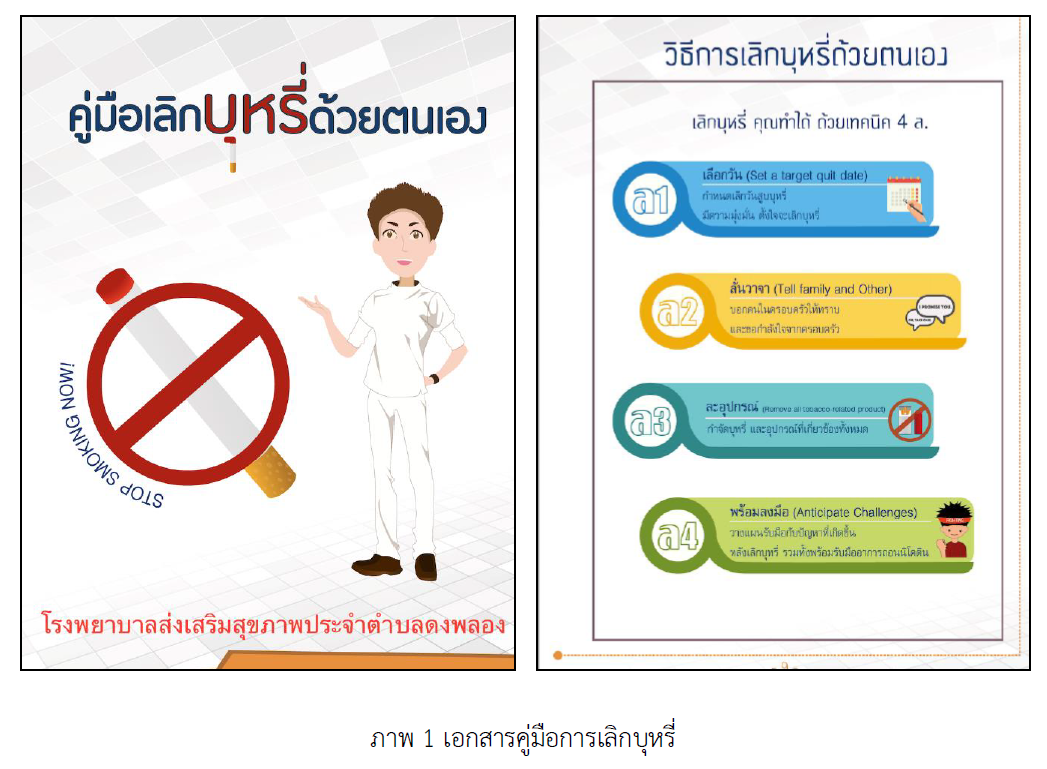THE EFFECTS OF A MOTIVATIONAL INTERVIEWING PROGRAM ON SMOKING QUIT IN PATIENTS WITH NON-COMMUNICABLE DISEASES (NCDs) AT A SUBDISTRICT HEALTH PROMOTING HOSPITAL
Keywords:
smoking cessation, NCDs patients, motivation, sub-district health promoting hospitalAbstract
This quasi-experimental study aimed to determine the effect of a motivational interviewing program on patients with non-communicable diseases (NCDs) by comparing smoking cessation between the motivational interviewing group and the usual care group. The sample was selected by purposive selection from patients with four major chronic non-communicable diseases, including heart disease, hypertension, chronic obstructive pulmonary disease (COPD), and diabetes, who were 18 years old or over at Dong Phlong Sub-district Health-Promoting Hospital in Nakhon Ratchasima province. Sixty participants were divided into a control group and an experimental group of 30 each. The data were collected through a smoking cessation interview form. The evaluation was made by following up on smoking cessation during the 7-day point prevalence of abstinence at 3 months after joining the program. The data were analyzed using descriptive statistics, Fisher exact test, and the Mann-Whitney U test.
The results showed that non-communicable disease patients in the experimental group after receiving the smoking cessation program at 3 months had a statistically significantly higher proportion of quitting smoking than those in the control group (p < .05). The experimental group had 8 people who were able to quit smoking out of 30 people (26.67 %), and the control group was able to quit smoking only 1 person out of 30 people (3.33 %). In addition, the experimental group had a lower average number of cigarettes smoked per day than the control group as well (p < .05). Therefore, sub-district health-promoting hospitals or other agencies can apply this motivational interviewing program to promote smoking cessation among patients with 4 chronic non-communicable diseases, namely heart disease, hypertension, COPD, and diabetes.
Downloads
References
Burns, N., & Grove, K. S. (2009). The practice of nursing research appraisal, synthesis, and general of evidence (6th ed.). Saunders Elsevier, St. Louis.
Caponnetto, P., Maglia, M., Floresta, D., Ledda, C., Vitale, E., Polosa, R., & Rapisarda, V. (2020). A randomized controlled trial to compare group motivational interviewing to very brief advice for the effectiveness of a workplace smoking cessation counseling intervention. Journal of Addictive Diseases, 38(4), 465-474.
Chalermrueangrong, J. (2018). The effect of motivation enhancement program for non-communicable diseases prevention on quitting smoking among Thai air force personal (Master of nursing science program, adult nursing). Faculty of Nursing, Chulalongkorn University, Bangkok, Pathumwan.
Division of Non-Communicable Diseases. (2022). Number and death rate from 4 non-communicable diseases (NCDs) 2016-2020. Retrieved from http://www.thaincd.com/2016/mission/documents-detail.php?id=14220&tid=32&gid=1-020
Dongplong Sub-district Health Promoting Hospital. (2021). Annual summary the data of NCDs 2021. Nakhon Ratchasima, Thailand.
Fatai, A. (2018). The effect of brief advice intervention on quitting smoking among patients at the emergency department (Master of nursing science program, adult nursing). Faculty of Nursing, Chulalongkorn University, Bangkok, Pathumwan.
Floyd, D. L., Prentice-Dunn, S., & Rogers, R. W. (2000). A meta-analysis of research on protection motivation theory. Journal of Applied Social Psychology, 30(2), 407-429.
Gillam, D. G., & Yusuf, H. (2019). Brief motivational interviewing in dental practice. Dentistry Journal, 7(2), 51.
Global Burden of Disease Collaborative Network. (2020). Global burden of disease study 2019: Global result. Retrieved from https://vizhub.healthdata.org/gbd-results/
Grobe, J. E., Goggin, K., Harris, K. J., Richter, K. P., Resnicow, K., & Catley, D. (2020). Race moderates the effects of motivational interviewing on smoking cessation induction. Patient Education and Counseling, 103(2), 350-358.
Grove, S. K., Burns, N., & Gray, J. (2012). The practice of nursing research: Appraisal, synthesis, and generation of evidence. Elsevier Health Sciences.
Kanungpiarn, T., Pomthong, K., pradubthong, O., & Hamchanan, N. (2022). The effects of health volunteers’ competency enhancement activities on knowledge and perceived self-efficacy in helping quit smoking. The Journal of Faculty of Nursing Burapha University, 30(3), 73-83.
Karom, N., & Preechawong, S. (2015). Predictors of short term smoking cessation among patients with chronic disease. Nursing Journal, 42(1), 1-11.
Khalid, M. T., & Bhatti, M. I. (2022). Psychometric properties of the Pakistani version of the Fagerstrom test for nicotine dependence. Journal of Education and Social Studies, 3(3), 205-212.
Ngamsombat, S. (2022). Effects of home visiting program for promoting smoking cessation at Mai Naree Tombon health promoting hospital, Kampang subdistrict, Nonthai district, Nakhonratchasima province. Regional Health Promotion Center 9 Journal, 16(2), 421-436.
Lindson, N., Thompson, T. P., Ferrey, A., Lambert, J. D., & Aveyard, P. (2019). Motivational interviewing for smoking cessation. Cochrane Database of Systematic Reviews, (7).
Preechawong, S., Visalseth, W., Ketlek. P., & Teanchot, Y. (2017). Provision of smoking cessation service in NCDs clinic. Journal of Nursing Science Chulalongkorn University, 29(1), 1-10.
Prentice-Dunn, S., & Rogers, R. W. (1986). Protection motivation theory and preventive health: Beyond the health belief model. Health Education Research, 1(3), 153-161.
Rogers, R. W. (1975). A protection motivation theory of fear appeals and attitude change1. The Journal of Psychology, 91(1), 93-114.
Rungruenghiranya, S., & Soonthorntham, S. (2012). Clinical practice guidelines for smoking cessation for health care provider in Thailand. Nonthaburi: Ministry of Public Health.
Sangariyavanich, S. (2021). The effect of brief intervention for smoking cessation in Nonthaburi’s primary care unit. Medical Journal of Srisaket Surin Buriram Hospital, 35(1),76-86.
Thato, R. (2018). Nursing research: Concepts to application. Bangkok: Chulalongkorn University press.
Wain, L. V., Shrine, N., Miller, S., Jackson, V. E., Ntalla, I., Artigas, M. S., . . . OxGSK Consortium. (2015). Novel insights into the genetics of smoking behaviour, lung function, and chronic obstructive pulmonary disease (UK BiLEVE): A genetic association study in UK Biobank. The Lancet Respiratory Medicine, 3(10), 769-781.
World Health Organization. (2022). Noncommunicable diseases 2022. Retrieved from https://www.who.int/newsroom/factsheets/detail/noncommunicable-disease
Yuniphan, J. (2012). Quit smoking guide. Bangkok: National Quit Call Center.

Downloads
Published
How to Cite
Issue
Section
License
Copyright (c) 2023 JOURNAL OF THE POLICE NURSES

This work is licensed under a Creative Commons Attribution-NonCommercial-NoDerivatives 4.0 International License.
ผลงานที่ได้ตีพิมพ์แล้วจะเป็นลิขสิทธิ์ของวารสารพยาบาลตำรวจ














